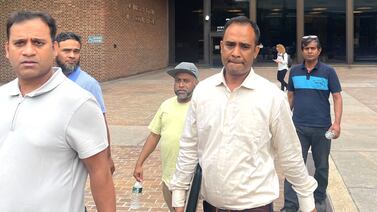Election Security
The Secretary of State’s Office shut down the site for a week after discovering unusual activity ahead of the July 15 primary.
A flurry of letters seek access to voter rolls and details on registration procedures, in support of Trump’s directives.
The facility was at one point used as used by an “unauthorized” person for shelter, according to the election commission’s latest report on the ballot snafu.
Attorney General Ken Paxton says the cases involve more than 100 voters, mostly in Harris County.
After Democrats’ 2024 losses, skepticism is seeping into the left — which could be a bad sign for turnout.
Several other states are facing new scrutiny as the Trump administration refocuses election-law enforcement.
A technical committee will soon review proposed changes to certification guidelines for voting systems. Local officials worry about the potential cost — and the impact on public faith.
The state’s in-house system has limitations that make it impractical for big cities. A committee is looking at commercial alternatives.
The judge takes a stern approach to defendants in Millbourne: ‘What you have done is undermine our democratic process.’
Ken Paxton sought more power for his office to take up election cases. But lawmakers haven’t agreed on a measure that would give it to him.
A failed conspiracy to steal a mayor’s race shows how manipulation can happen at the local level. But just how big is the threat?
The indictments target five public officials, including a former elections administrator.
There’s no evidence to suggest that it’s a widespread problem, or even a medium-sized one. But the talk persists, and it’s driving policy.
The new security features, a response to years of false claims and conspiracy theories, will be introduced in the 2026 midterm election.
The memorandum heightens fears about retribution against those who upheld the integrity of the 2020 election
The technology helps speed up vote counting, but critics say it doesn’t leave a verifiable paper trail. Getting rid of it could be costly.
With the SAVE Act back on the table and proposals in 19 states, voters around the country could soon be facing similar challenges.
A new bill responds to court rulings that have restricted the state’s authority to supersede decisions by local prosecutors.
In a letter to the homeland security secretary, Al Schmidt cites the critical help local election officials have gotten from the U.S. cybersecurity agency CISA.
Election officials throughout the country rely on a voter-verified paper trail. But the president’s supporters are pushing for eliminating machines, which could undermine election security and efficiency.
















